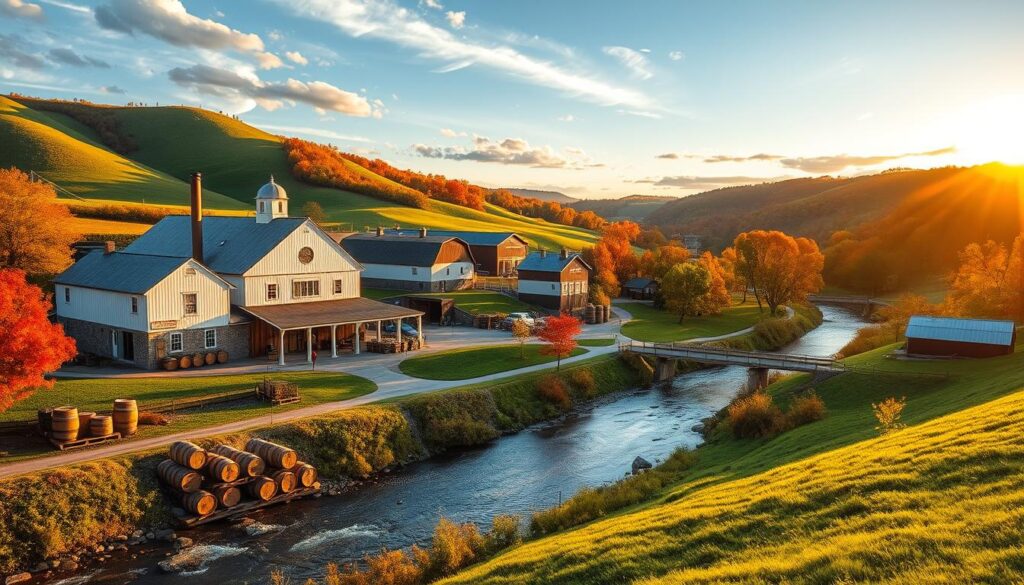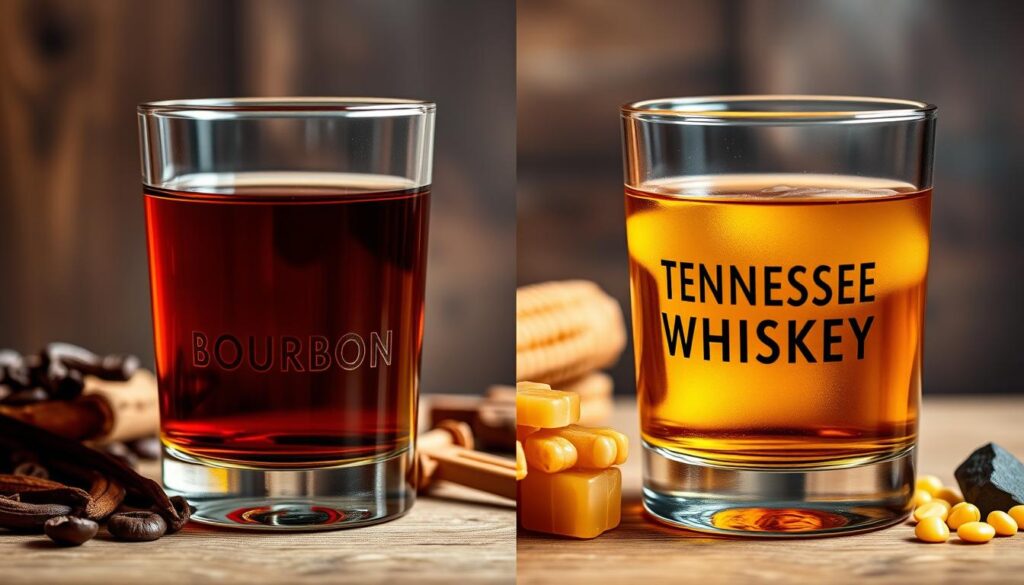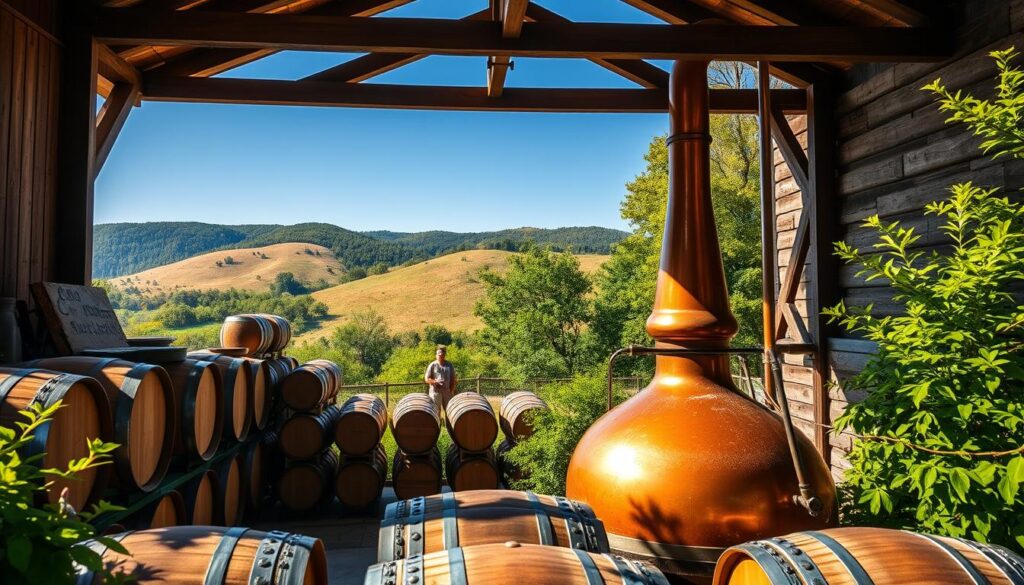When it comes to American whiskey, few debates are as spirited as the one between bourbon and Tennessee whiskey. Both are rich in flavor, steeped in tradition, and beloved worldwide — but what truly sets them apart?
Is it just a matter of geography, or do their production methods create distinct experiences in every sip?
Understanding the differences between these two iconic spirits deepens your appreciation for every sip. From oak barrels to limestone-filtered water, the craftsmanship behind bourbon and Tennessee whiskey is a testament to tradition and expertise.
Join us as we explore the timeless debate of bold versus smooth. We’ll uncover the distinct flavor profiles and rich heritage that make these American whiskeys truly exceptional.
Step into the fascinating world of bourbon and Tennessee whiskey to discover what sets them apart and makes each one unforgettable.
Understanding Bourbon: The Basics
Bourbon is a favorite American whiskey with a long history and strict rules. Producers must make it in the United States and include at least 51% corn. This gives it its sweetness and distinguishes it from other whiskeys.
Bourbon production follows strict controls. Distillers use new charred oak barrels for aging, which adds special flavors and colors. The distillers fill these barrels with the spirit at no more than 62.5% alcohol and bottle it at 40% ABV. Charred oak is key in bourbon’s taste and smell.
People often link bourbon to Kentucky, but distillers can make it anywhere in the U.S. However, Kentucky, home to the Bourbon Festival in Bardstown, produces about 95% of bourbon.
The Kentucky Bourbon Trail features famous distilleries like Jim Beam, Maker’s Mark, and Woodford Reserve. These brands show the skill and quality that make bourbon special.

The Origin of Bourbon
Bourbon history is deeply rooted in American culture, with its birthplace often attributed to Kentucky. This state’s unique features created the perfect environment for distilling and aging whiskey. Kentucky bourbon owes its distinct character to the region’s rich corn harvests, limestone-filtered water, and seasonal temperature changes.
The story of American whiskey origins dates back to the 18th century. Early settlers and immigrants brought their distilling knowledge to the New World. These pioneers shaped the foundation of what would become a thriving industry. Kentucky produces an astounding 95% of the world’s bourbon, thanks to its natural resources and ideal climate conditions.
A significant milestone in bourbon history came in 1964. Congress declared it a “distinctive product of the United States.” This recognition solidified bourbon’s unique status in America’s spirit industry. Today, bourbon must adhere to strict regulations, including a mash bill containing at least 51% corn and aging in new, charred oak barrels. These standards ensure the quality and authenticity of Kentucky bourbon, preserving its rich heritage for generations to come.
What Is Tennessee Whiskey?
Tennessee whiskey is a special spirit made in Tennessee. It’s similar to bourbon, needing at least 51% corn and aging in new charred oak barrels. But what makes it unique is the Lincoln County Process.
This step filters the spirit through sugar maple charcoal chips before aging. It’s named after Lincoln County, Tennessee, where it started. This process gives Tennessee whiskey its smooth, distinctive taste.
Jack Daniel, a whiskey pioneer, made this method famous in the late 1800s. He used local ingredients and spring water from Lynchburg, Tennessee. Today, about 30 distilleries in Tennessee make this special spirit.
The charcoal filtering is key. It softens the whiskey and adds a unique earthy flavor. Each distillery filters differently. For example, Uncle Nearest’s whiskey slowly drips through 12 to 16 feet of charcoal.
Tennessee whiskey must meet bourbon standards and go through the Lincoln County Process. This tradition has lasted for centuries, making it a key part of Tennessee’s whiskey history.
The Distillation Process
Whiskey distillation is a fascinating process that sets bourbon and Tennessee whiskey apart. Both spirits start their journey in a similar way. But, Tennessee whiskey takes an extra step.
The Lincoln County Process, unique to Tennessee whiskey, involves filtering the spirit through sugar maple charcoal before aging. This step gives Tennessee whiskey its distinct smoothness.
Bourbon, on the other hand, skips this filtration step.Distillers must distill it to no more than 160 proof, or 80% alcohol by volume. After distillation, the distiller places both spirits in charred oak barrels for aging. These barrels play a crucial role in developing the rich flavors and amber color we associate with these beloved whiskeys.
While bourbon has no minimum aging period, it must rest in barrels for at least two years to earn the label “straight bourbon.” Tennessee whiskey typically follows similar aging requirements.
During this time, the whiskey interacts with the charred oak barrels, absorbing flavors and developing complexity. This whiskey aging process is what gives both spirits their distinctive taste profiles, making them favorites among whiskey enthusiasts.

Regulations and Standards
Whiskey regulations define bourbon and Tennessee whiskey. Distillers must make bourbon in the U.S. and use a mash with at least 51% corn. They also age it in new charred oak barrels and ensure it meets specific proof levels.
Tennessee whiskey follows similar rules but includes a special step. The Lincoln County Process, a charcoal filtering method, distinguishes it from bourbon. Distillers must produce Tennessee whiskey in Tennessee and use a mash with at least 51% corn. They limit the proof to 160 during distillation.
Producers filter the spirit through maple charcoal before aging. Prichard’s Distillery avoids this step due to its establishment before state laws set the requirement. They cap the barrel entry proof at 125 and maintain a minimum bottling proof of 80.
The debate over Tennessee whiskey’s classification as bourbon continues. Some argue the Lincoln County Process makes it unique. While it meets federal bourbon standards, Tennessee whiskey might soon receive its own federal protection. This highlights the complexity of whiskey regulations and the importance of preserving regional traditions.

Flavor Profiles: Bourbon vs. Tennessee Whiskey
Bourbon and Tennessee whiskey have unique tastes. Bourbon is popular for its sweetness, with notes of vanilla and caramel. This comes from its mash bill, which is mostly corn. The aging in oak barrels adds a woody flavor. Rye in the mix gives a spicy touch.
Tennessee whiskey is smoother, thanks to a special filtering process called the Lincoln County Process. This process makes it different. Tennessee whiskey often has a nutty flavor with hints of banana. It also has caramel sweetness and vanilla from oak aging.
This filtering makes Tennessee whiskey smoother than bourbon. It gives it a unique taste. Whether you like bourbon’s bold sweetness or Tennessee’s mellow richness, both are great for whiskey lovers.
Popular Brands To Try
Bourbon and Tennessee whiskey brands offer a wide range of flavors. Kentucky is famous for its bourbon, with Jim Beam, Maker’s Mark, and Woodford Reserve leading the way. These brands have been around for a long time, each with its own special qualities.
Tennessee whiskey brands also have a big following. Jack Daniel’s is the top-selling American whiskey worldwide. George Dickel is close behind, offering a Single Barrel whiskey for $80. Newer distilleries like Nelson’s Green Brier are also making a splash with their $30 Tennessee Whiskey.
If you’re looking for something special, check out Jack Daniel’s Single Barrel Barrel Proof Rye, priced at $269. Cascade Moon Whisky Edition No. 2 is another luxury option to consider. B.R. Distilling’s Juke Joint 3-year-old straight Kentucky bourbon, priced at $60, is a great choice for those who love bourbon.
With over 30 distilleries in Tennessee, the whiskey world is always changing. Whether you like the high corn content of Tennessee bourbons or the varied flavors of Kentucky, there’s a whiskey out there for you.

Cocktails Featuring Bourbon and Tennessee Whiskey
Bourbon and Tennessee whiskey are stars in whiskey cocktails. The Old Fashioned, a timeless bourbon drink, began as a medicinal ‘bittered sling’. It combines whiskey, bitters, sweetener, and citrus peel. Bourbon’s sweet, spicy flavors are ideal for this and other classics like the Manhattan and Mint Julep.
Tennessee whiskey mixology brings unique tastes. The Lynchburg Lemonade, made by Jack Daniel’s, highlights the spirit’s smoothness. Both whiskeys are great in sours and highballs. Choosing between them can slightly alter a cocktail’s flavor.
Glassware and garnishes are crucial in bourbon drinks. Bartenders serve most in rocks or cocktail glasses, garnished with citrus twists or cherries. For a twist, try a Paloma with bourbon instead of tequila. This grapefruit-based drink pairs well with any bourbon or rye.
Whether you like bourbon or Tennessee whiskey, both offer endless creative possibilities. From classic recipes to modern twists, there’s a whiskey drink for everyone. Explore the world of whiskey cocktails and find your new favorite mix.
Food Pairing Recommendations
Whiskey food pairings can improve your meals. Bourbon pairs well with rich dishes. Its sweet flavors, like caramel and vanilla, go great with fatty meats like duck and ribeye steak.
In Kentucky, distillers make 95% of the world’s bourbon. Bourbon and BBQ are a perfect match there.
Tennessee whiskey has its own special taste. It’s smoother and pairs well with smoked meats and aged cheeses. Try it with extra-mature cheddar for a great taste.
For dessert, Tennessee whiskey goes well with fruit-based treats or apple pie.
Both spirits are great at cooking, too. They make sauces and marinades taste better. At Kentucky’s Bourbons Bistro, you can try over 130 bourbons and find new pairings.
Bourbon must be at least 51% corn this makes it sweet, perfect for desserts like Crème Brulee or vanilla ice cream. Bourbon with buttered popcorn is also a great snack.
Conclusion: Celebrating American Whiskey
Whether you prefer bourbon’s bold character or Tennessee whiskey’s smooth sophistication, both represent the pinnacle of American whiskey-making traditions. Each sip tells a story of craftsmanship, history, and regional pride.
Exploring these iconic spirits lets you appreciate their unique qualities, whether neat, in a cocktail, or with food.
The next time you pour yourself a glass, take a moment to savor the distinct flavors and heritage that make bourbon and Tennessee whiskey truly special. Cheers to discovering your favorite!
If this journey into American whiskey has sparked your curiosity, why stop here? Explore the smoky elegance of Scotch, the rich traditions of single malts, and the incredible diversity of whiskies from around the world.